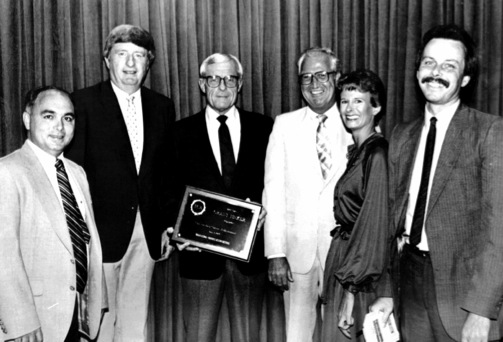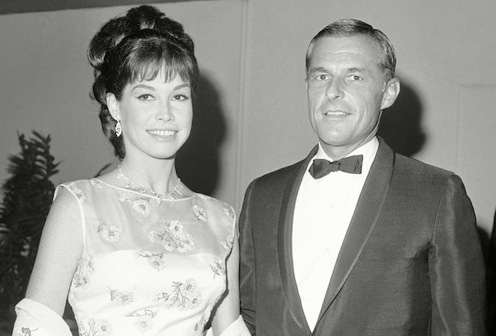RIP Grant Tinker: Jan. 11, 1926 to Nov. 28, 2016
11/30/16 03:49 PM

By ED BARK
@unclebarkycom on Twitter
Grant Tinker, the self-deprecating visionary who founded a legendary TV studio, resurrected a comatose network and received the Television Critics Association’s first Career Achievement award, has died at age 90 in his home. Lamentably a bygone relic to most younger viewers, his death wasn’t even made public until two days after the fact.
Tinker’s MTM Enterprises, which he formed in 1969 with his then wife, Mary Tyler Moore, birthed some of television’s most esteemed series, including The Mary Tyler Moore Show, The Bob Newhart Show, WKRP in Cincinnati, Lou Grant, The White Shadow, Remington Steele, Hill Street Blues and St. Elsewhere. The latter three series became key parts of NBC’s prime-time lineup of the early- to mid-1980s. Tinker took over as chairman and CEO in 1981 shortly after his divorce to Moore.
The Peacock’s fortunes had hit rock bottom under previous programming head Fred Silverman, with a menu that included eyesores BJ and the Bear, Sheriff Lobo, Games People Play, Speak Up America and a knuckle-dragging series version of the club-swinging hit movie, Walking Tall.
Tinker slowly but surely brought NBC back on the backs of high-quality series such as Hill Street, St. Elsewhere, Remington Steele and, most importantly, a Thursday night blockbuster comedy lineup of The Cosby Show, Family Ties, Cheers and Night Court. By the time of the 1985-’86 TV season, his last at the helm, NBC had won the prime-time ratings for the first time since 1970-’71.
During an April 1986 stop in Dallas, where he accepted the Distinguished Service Award at the National Association of Broadcasters convention, Tinker was winding down and readying his departure from NBC after the network’s RCA-General Electric merger became official. He nonetheless agreed to an extensive interview with this reporter, both downplaying his achievements and taking satisfaction in them.
“There were people who were doing a lot of doomsaying about NBC,” he recalled, “talking about a world with only two networks. So in that period of time we’ve done a great deal. We’ve restored the company. We now have a preeminence that is hugely satisfying. But I didn’t do it. I can honestly look anybody right in the eye and say I’m just one of many.”
One of his top lieutenants at the time, public information head M.S. “Bud” Rukeyser, had quit NBC in frustration during the Silverman years before Tinker wooed him back. He immediately savored the difference between the two regimes.
“We had total turmoil under the predecessor,” Rukeyser said. “There was a churning of people, churning of programs, total instability and people spending much of their working day worrying about their jobs and survival and so on. The day that Grant came in, the great calming influence was there. People were able to sit at their desks all day and do their jobs. It sounds kind of simple, but that was a big change from what had happened before.”
Tinker, Connecticut-born and California-cooled during his 11 years as head of MTM, had a laid-back vibe in times when those terms were operative. He didn’t like dressing up and more or less dreaded spending Mondays through Thursdays in New York as part of his chairmanship. He both believed in the power of quality programming and the effectiveness of keeping his hands off once a show was up and running.
Hill Street Blues co-creator Steven Bochco noted that Tinker “doesn’t try to change you. He doesn’t destroy the thing in you that attracted him in the first place.”
“I guess it is a strength,” Tinker said. “But I don’t know why it should be so unusual. Delegating is really nothing more than letting people help you. It’s a kind of aspect of laziness almost. It’s selfish as opposed to altruistic behavior, so I wonder why everybody doesn’t do it. It doesn’t seem like such black magic to me.”
He admittedly wavered at times on the quality front during his earlier years at NBC, particularly when low-brow series such as The A-Team and Knight Rider caught on quickly while Hill Street Blues, Family Ties and Cheers continued to struggle.
“Some of the more literate shows have a hard time these days,” he told TV critics in June 1984 as NBC prepared to do battle in another TV season. “If you don’t turn over those cars, I think they do go across the street and look at the other guy’s shows where that is happening. We have to be in that ballgame or go out of business . . . It is true that I have sort of modified my own opinion about how we should schedule NBC. Before I used to sing that MTM quality song perhaps a little too loud.”
But hallelujah, then along came The Cosby Show, an instant hit and faith-healer that likewise made big hits of the two Thursday night comedies in its wake, Family Ties and Cheers.
By the time of our April 1986 interview, Tinker had been made whole again.
“I’ve always felt there’s no reason people shouldn’t have good television as opposed to not-so-good,” he said. “But there was a period when I got a little discouraged. We put a few things on that didn’t work, and I began to fret about the audience. I tried to blame them as opposed to ourselves. But then when things began to work again, my faith in the audience was restored and it remains today . . . Leave good television on and the audiences usually will come around to find it. Not only is it satisfying as a result, but it is selfishly and commercially the better way to go. It’s less expensive. I’m always a little surprised that people see it as such an unusual way for a network to behave. It strikes me as the only way to behave.”

Tinker’s preference for TV’s high ground didn’t stop him from defending, sort of, his involvement in 1965’s My Mother the Car, which he helped to nurture during an earlier six-year stint as one of NBC’s programming vice presidents.
“People use that as the bottom, the absolute lowest television show ever,” Tinker said. “I don’t. I still think My Mother the Car was a funny idea that might have worked.”
Funny how things can work out, though. My Mother the Car’s creator, Allan Burns, went on to collaborate with Tinker on The Mary Tyler Moore Show.
He also wasn’t above throwing a few jabs. When CBS carped that NBC would have remained an also-ran without The Cosby Show factor, Tinker retorted, “If you took 60 Minutes and Sunday Night away from CBS, they would be floating on a raft in the Atlantic somewhere.”
Tinker also was no fan of paying mega-salaries to TV series stars after their shows took off in the ratings. When Dallas star Larry Hagman held out for a giant pay increase during the height of the show’s “Who Shot J.R.?” frenzy, Tinker told TV critics in 1980, “Maybe he shouldn’t recover. Whatever CBS is paying Larry Hagman, you could kill a disease with it. When somebody goes bananas (on an MTM-produced show), we tend to excuse them . . . I think it would have been a celebrated opportunity to show that the inmates don’t run the asylum.”
Tinker didn’t intend to go quietly into the night after leaving in 1986 as NBC chairman at the age of 60. But it kind of worked out that way. His new GTG Entertainment, bankrolled by the Gannett company, birthed several flops in the early going, most notably the syndicated USA Today: The Television Show. A trio of prime-time series for CBS, Raising Miranda, The Van Dyke Show and TV 101, were all quickly canceled, with only the latter show receiving decent reviews from TV critics.
“I’m just another shlepper now,” Tinker said when yours truly waylaid him en route to a Los Angeles hotel parking lot back in January 1989. He was at the hotel to tape a 40th birthday message for then NBC entertainment president Brandon Tartikoff, who had joined with Tinker in taking NBC back to the top. The “shlepper” bled with class, of course, when asked about his post-Peacock tribulations.
“I think it’s a good lesson in how quickly you can come down from being up,” he said. “But I had so much more than my share of good press at MTM and then at NBC. What is there new to write about me except failure? So when people see a little bit of that, it makes good copy. That’s OK. I’m old enough so that it’s not going to kill me.”
He did, however, have a little show called Baywatch on the drawing board for a possible spot on the NBC schedule. And although it will never be confused with high-caliber television, it did bring Tinker the glow of one last hit before GTG shut down.
He was little seen in the last two decades, at least not at public functions. But Tinker did show up at one more TCA awards ceremony years after he flew in on short notice from a programming conference in Maryland to accept that inaugural career achievement award in June 1985. Tinker was the only one invited to that first “ceremony” at the Century Plaza Hotel in Los Angeles. The TCA, then a seven-year-old organization, didn’t want to put on a big show for fear it might become an embarrassing spectacle. So the other winners were simply announced during the course of a bare-bones 20-minute ceremony.
“God, this is really embarrassing,” Tinker said, referring not to the award itself but on the decision to give it to him. “I think that you and I are more frequently on the same wavelength than we are not.”
It was quite a wavelength -- and no one rode it better than Grant Tinker.
Email comments or questions to: unclebarky@verizon.net
